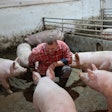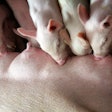The Ninth Circuit Court of Appeals has declared valid a California law preventing the processing of downed animals for human consumption. The National Meat Association and the Meat Institute brought suit in federal court to prevent the state from enforcing the law. A group of welfare organizations including the HSUS, Farm Sanctuary, The Humane Farming Association and the Animal Legal Defense Fund intervened in this lawsuit in 2009.
The California law was enacted following revelations of improper practices at the Hallmark-Westland plant. The decision by the Ninth Circuit was hailed as a victory by the HSUS in a recent press release.
Based on videos, testimony and the disposition of cases brought against employees of the now defunct company there were obvious deviations from acceptable practice. It is accepted that the situation at Hallmark-Westland did not reflect the entire industry nevertheless one Hallmark-Westland is one too many. The fact that the National Meat Association and the American Institute tried to overturn the law passed in California sends the wrong message to consumers and strengthens the position of the groups allied against intensive animal production.
Frankly, as a veterinarian and a retired teacher of public health and in a personal sense a grandfather, I would want a duly qualified FSIS inspector to rule on the eligibility of any downed animal for slaughter and processing for human consumption. An acute leg or pelvic fracture necessitates emergency euthanasia. Subsequent post mortem examination should determine whether the carcass is fit for consumption.
Animals which are febrile or do not respond to rehydration or administration of electrolytes during a holding period in the lairage should not be processed. There is plenty of blame to go around for the Hallmark-Westland episode.
- Where were the FSIS inspectors when downed animals were subjected to electrical prodding, dragging using forklifts and other inhumane practices?
- Why did the management of the company condone unacceptable handling and why were USDA-FSIS procedures not followed?
- What is the obligation of farmers in shipping sick or injured animals to salvage their value?
If downed animals were condemned at the time of unloading it would certainly result in a change of policy on the part of consignors.
My message to the American Meat Institute is simple. If there is a problem, work constructively to resolve the issue and do not take action to sidestep reality. Resorting to legal opposition ran the risk of degrading the image of the meat industry by opposing a law which was enacted in response to long-standing and gross deviations from acceptable practice.
If Hallmark-Westland was in fact an aberration then so be it. Adherence to the California law would not be a hardship. If in fact the practice of slaughtering downed animals is a common occurrence then it should be stopped. The fact that the plant in question was a major supplier of ground beef to the National School Lunch Program makes the situation even more egregious and again provides ammunition for the opponents of intensive agriculture in Washington.
There are times when litigation to oppose unjust laws and regulations is justifiable. We support and applaud our industry associations for action they have taken to encourage practices which benefit both producers and consumers. The fact that the senior judge in his opinion indicated that “public health professionals are rightly concerned about the risk of downed cows probably because animals can become non-ambulatory due to disease” represents common sense.
The failed litigation has now created a precedent through case law and will be beneficial for industry opponents such as Gene Bauer of Farm Sanctuary who stated “we applaud the court for refusing to protect the interest of big agribusiness at the expense of the American people and the animals entrusted in our care.”
By initiating the lawsuit, the National Meat Association and the American Meat Institute have handed the HSUS and its affiliates a victory. Their support for the law will be conveyed to millions through the social media, all to the ultimate detriment of the image of honest, caring and concerned producers of meat and eggs.












